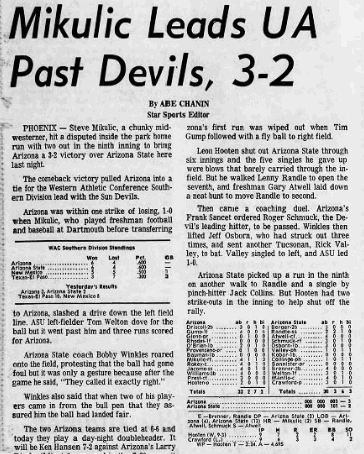Imagine the young man who would break the NCAA record for hits in a baseball season showing up unannounced on your campus, a walk-on like few others, asking if he could participate in some of your fall intrasquad games.
That was what Arizona baseball coach Frank Sancet discovered in the fall of 1968 when Steve Mikulic, a former quarterback at Dartmouth, enrolled at Arizona as a pre-med major.
After watching Mikulic hit for a few weeks, Sancet offered him a half scholarship for the 1970 season.
How’d it work out? Mikulic hit .393, broke the NCAA record with 91 hits, was selected a first-team All-American and led the Wildcats to the 1970 College World Series.
A few years ago, long-time Tucson dentist Pat Anderson, one of the leading forces behind the organization of grassroots baseball in Tucson, told me about Mikulic.
“Steve isn’t in the UA Sports Hall of Fame and as time goes on, more and more people are unaware of what he accomplished,” said Anderson. “I’m going to be his advocate and do something about it before it’s too late.”
Mission accomplished.
On Thursday night at the Westin La Paloma Resort, Mikulic will return to Tucson for the first time in 23 years and be inducted into the UA Sports Hall of Fame.
“Learning that I had been selected for induction was amazing; I got emotional,” says Mikulic, who turned 70 last week. He said 1970 “was a magical season; my years at Arizona were very rewarding, very memorable.”
If someone like Steve Mikulic of Thornridge High School in south suburban Chicago came along today, a three-sport star with a 4.0 GPA, a coach like Sancet would’ve known all about him. The Kansas City Royals drafted Mikulic in the summer of 1967, but after being accepted by Dartmouth, Mikulic chose a higher education over the low minor leagues.
Mikulic went to Dartmouth, an Ivy League school whose first home baseball game in 1968 wasn’t scheduled until April 26. By then, most UA ballplayers had more than 100 at-bats and three months of practice.
A friend from Thornridge attending Arizona, Bill Scholl, whetted Mikulic’s baseball appetite, keeping him informed of the baseball weather and Arizona’s status as a legitimate national championship contender.
“I wrote to Bill and asked him if I’d have a chance to play at Arizona,” Mikulic remembers. “He encouraged me.”
After sitting out the 1969 season because of NCAA transfer rules, Mikulic began the ’70 season as a backup infielder. After a few weeks of practice, Sancet told reporters “once the season began, we saw that we couldn’t get along without Steve.”
Mikulic completed his Arizona career with a .393 batting average, which remains No. 5 in school history. Until now, for whatever reason, he was not elected to the school’s sports hall of fame. Some of it might be that he did not reach the big leagues and add to his legacy, but there’s a good reason for that.
The Cleveland Indians drafted Mikulic in the summer of 1971 and sent him to Class A Reno. He hit .344 and was promoted to Class AA Jacksonville two months later. He seemed to be on a track to reach the big leagues.
But life in America, 1971, was complicated for a 21-year-old ballplayer. It was the era of the Vietnam War, and as such, Mikulic was placed in a draft lottery for military service. Based on your birth date, everyone was assigned a number from 1 to 365. Those whose numbers were lower than 195 ultimately got drafted — unless they had an academic deferment or were married, with children.
Mikulic’s draft number was far below 195.
He had been a first-team Academic All-American at Arizona, was awarded an NCAA post-graduate scholarship and had been accepted to the School of Dentistry at USC.
“About Labor Day, after my year in pro baseball, I had to make a decision about going to dental school or hope to find a National Guard unit and continue playing baseball,” says Mikulic. “I made the decision to leave baseball.”
He was 22.
“I often reflected on that decision, especially the first few years,” he says. “But the odds aren’t in anyone’s favor to get to the big leagues unless you are an extraordinary talent. It’s a crapshoot — a lot of guys I played with had a few years in the majors — but I made the right decision.”
Mikulic graduated from USC’s dental school in 1975. He was quickly hired by a dental practice in the Bay Area, ultimately bought his own dental firm in Redwood City, sold it, and later bought another in Foster City, California. He still practices dentistry three days a week, and is also a clinical professor at the University of Pacific.
Mikulic and his wife Barbara, also an Arizona alumnus, will spend five days in Tucson this week, reliving memories and spending time with UA baseball teammates.
Favorite memory?
In May of 1970, Mikulic hit a three-run homer in the ninth inning to beat Arizona State 3-2, a victory which essentially put Arizona into the NCAA playoffs, from where the Wildcats rolled past BYU and Denver to reach the College World Series.
“That was about as good as it gets,” he remembers. “I have nothing but good memories about my time at Arizona.”





